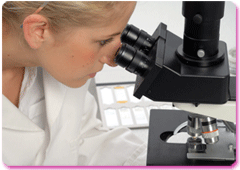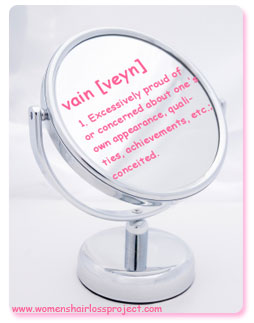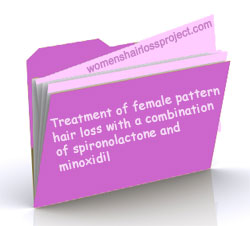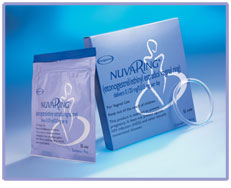 Hello Everyone. I am so happy to know that I am not alone in my hair loss devastation. I am a 28 year old mother of four. I’ve been experiencing heavy hair loss and extreme changes in the texture of my hair since the pregnancy with my daughter 5 years ago. Much to my dismay, my doctors were telling me that I was pulling my hair back too often or that my hormones just needed to get back to normal or that the straightening process I had done had caused the loss. So for five years I have watched my very thick, very curly hair become thin and straight thinking that one day it would magically reappear. It was two weeks ago that I had a scalp biopsy and was diagnosed with andogenetic alopecia. To boot, I am losing it from all over my head, not just the top. My dermatologist is pretty cruel and just chuckled and said “There’s nothing you can really do. Use Rogaine.” I am devastated. My daughter has hair just like mine used to be and I’m actually jealous of her. I’m debating whether to have the fifth child that my husband and I wanted but I don’t want to spark any excess shedding episodes. I have started Rogaine as it is the only FDA approved medication for women but I am feeling very lightheaded and somewhat dizzy so I’ll probably have to stop. I realize like many of you that this has quickly become an obsession. I know that I am not my hair. But let me tell you, after four children, my body is beat. My hair is the only attribute I have left and I’m losing that now too. I’m at an incredible loss. I can’t imagine what it will look like when I’m 40. Please give me any feedback you can and I hope this post helps someone feel not so alone as this site has helped me tremendously.
Hello Everyone. I am so happy to know that I am not alone in my hair loss devastation. I am a 28 year old mother of four. I’ve been experiencing heavy hair loss and extreme changes in the texture of my hair since the pregnancy with my daughter 5 years ago. Much to my dismay, my doctors were telling me that I was pulling my hair back too often or that my hormones just needed to get back to normal or that the straightening process I had done had caused the loss. So for five years I have watched my very thick, very curly hair become thin and straight thinking that one day it would magically reappear. It was two weeks ago that I had a scalp biopsy and was diagnosed with andogenetic alopecia. To boot, I am losing it from all over my head, not just the top. My dermatologist is pretty cruel and just chuckled and said “There’s nothing you can really do. Use Rogaine.” I am devastated. My daughter has hair just like mine used to be and I’m actually jealous of her. I’m debating whether to have the fifth child that my husband and I wanted but I don’t want to spark any excess shedding episodes. I have started Rogaine as it is the only FDA approved medication for women but I am feeling very lightheaded and somewhat dizzy so I’ll probably have to stop. I realize like many of you that this has quickly become an obsession. I know that I am not my hair. But let me tell you, after four children, my body is beat. My hair is the only attribute I have left and I’m losing that now too. I’m at an incredible loss. I can’t imagine what it will look like when I’m 40. Please give me any feedback you can and I hope this post helps someone feel not so alone as this site has helped me tremendously.
Thank you,
Amber
***********************
Dear Amber,
You are not alone in your feelings and struggles. I wish I knew why most doctors are so insensitive and callus toward the women who seek out help for their hair loss. I can’t explain why they do it, but it is an unfortunate very common occurrence. Was your dermatologist by any chance a man? They seem to be the least understanding.Just like the birth control pills can somethings kick in the onset of androgenetic alopecia early so can the hormone shift of having children, sometimes there is just no rhyme or reason, but undoubtedly we are never prepared. There are other “treatments” used to treat women’s hair loss such as low androgen index birth control pills and aldactone (spironolactone). All hair loss treatments carry the risk of possibly igniting some extra shedding at first. It’s the whole, “has to get worse better it gets better type thing.” It’s all a very personal decision what a woman chooses to use to treat herself, and she has to fully understand the postives vs. the negatives. Hopefully in time there will be more studies done to figure out what exactly causes women’s hair loss and then with any luck a real solution for women’s hair loss will follow. [click to continue…]
{ 8 comments }
















